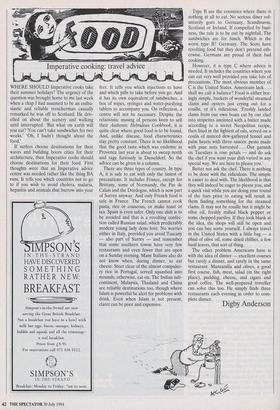Imperative cooking: travel advice
WHERE SHOULD Imperative cooks take their summer holidays? The urgency of the question was brought home to me last week when a chap I had assumed to be an enthu- siastic and reliable trencherman casually remarked he was off to Scotland. He driv- elled on about the scenery and walking until interrupted: 'But what on earth will you eat? You can't take sandwiches for two weeks."Oh, I hadn't thought about the food.'
If surfers choose destinations for their waves and building boors cities for their architecture, then Imperative cooks should choose destinations for their food. First thoughts were that an Imperative advice centre was needed rather like the thing BA runs. It tells you which countries not to go to if you wish to avoid cholera, malaria, hepatitis and animals that burrow into your
feet. It tells you which injections to have and which pills to take before you go. And it has its own equivalent of sandwiches, a box of wipes, syringes and water-purifying tablets to accompany you. On reflection, a centre will not be necessary. Despite the relativistic musing of persons keen to sell their Authentic Hebridean Cookbook, it is quite clear where good food is to be found. And, unlike disease, food characteristics stay pretty constant. There is no likelihood that the good taste which was endemic in Provence last year is about to sweep north and rage furiously in Dusseldorf. So the advice can be given in a column.
There are three types of country. In type A, it is safe to eat with only the tiniest of precautions. It includes France, except for Brittany, some of Normandy, the Pas de Calais and the Dordogne, which is now part of Surrey anyway. And only French food is safe in France. The French cannot cook pasta, rice or couscous, or make toast or tea. Spain is even safer. Only one dish is to be avoided and that is a revolting confec- tion called Russian salad, which predictably modern young lady dons love. No worries either in Italy, provided you avoid Tuscany — also part of Surrey — and remember that some southern towns have very few restaurants and even fewer that are open on a Sunday evening. Many Italians also do not know when, during dinner, to eat cheese. Steer clear of the almost compulso- ry rice in Portugal, served squashed into mounds; otherwise, eat on. The Indian sub- continent, Malaysia, Thailand and China are reliable destinations too, though where Islam is powerful be alert for problems with drink. Even when Islam is not present, claret can be poor and expensive. Type B are the countries where there is nothing at all to eat. No serious diner vol- untarily goes to Germany, Scandinavia, Scotland or Ireland. If compelled by busi- ness, the rule is to be out by nightfall. The sandwiches are for lunch. Which is the worst type B? Germany. The Scots have revolting food but they don't pretend oth- erwise. Germans are proud of their bad cooking.
However, it is type C where advice is needed. It includes the countries where you can eat very well provided you take lots of precautions. The most obvious member of C is the United States. Americans lack . shall we call it balance? Food is either bor- ingly simple, buckets of wonderful steamed clams and oysters just crying out for a rouille, or it's ridiculous: 'Freshly landed clams from our own boats cut by our chef into stripettes anointed with a batter made according to a secret Neopolitan recipe, then fried in the lightest of oils, served on a coulis of minced dew-gathered fennel and palm hearts with three sauces: pesto made with pine nuts harvested . . . Our garnish on Tuesdays is rose petals — and do ask the chef if you want your dish varied in any special way. We are here to please you.'
Better not ask the chef. There is nothing to be done with the ridiculous. The simple is easier to deal with. The likelihood is that they will indeed be eager to please you, and a quick visit while you are doing your round of the bars prior to eating will result in them finding something for the steamed clams. It may not be rouille but it might be olive oil, freshly milled black pepper or some chopped parsley. If they look blank at the idea, the shops will still be open and you can buy some yourself. I always travel in the United States with a little bag — a phial of olive oil, some dried chillies, a few basil leaves, that sort of thing.
The other problem Americans have is with the idea of dinner — excellent courses but rarely a dinner, and rarely in the same restaurant: Manzanilla and olives, a good first course, fish, meat, salad (in the right place), pudding, cheese, and cigars and good coffee. The well-prepared traveller can solve this too. He simply finds three restaurants each evening in order to com-


















































 Previous page
Previous page